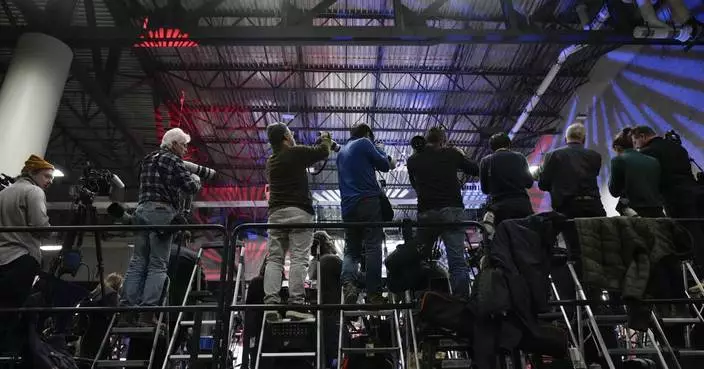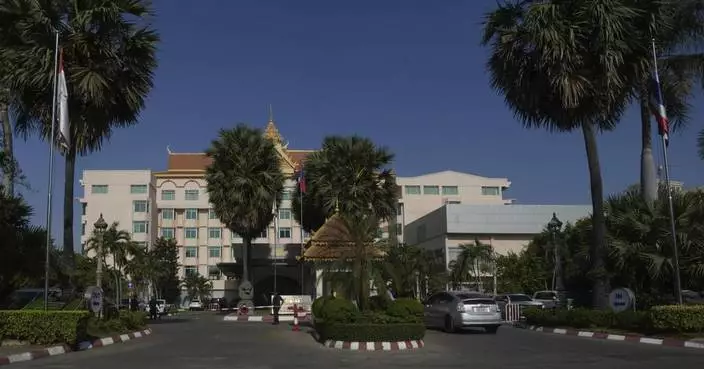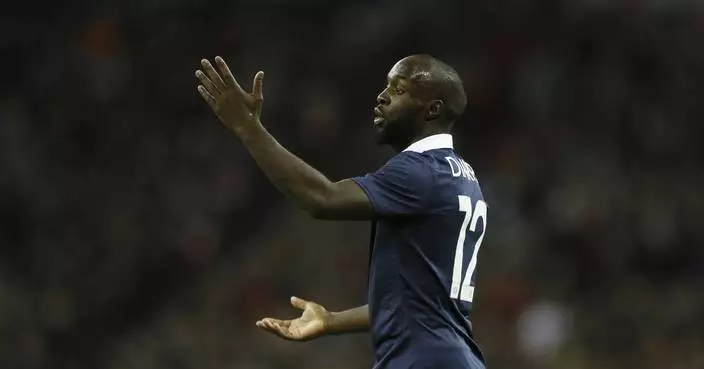Eugene Reavey was tired and losing his voice, but the 72-year-old gathered with his neighbors on the border between Northern Ireland and the Republic of Ireland on a cold October evening to express their fears about what Brexit could mean for them.
Peace is personal for Reavey. He lost three brothers to the conflict in Northern Ireland, which claimed more than 3,500 lives over three decades.
Click to Gallery
Eugene Reavey was tired and losing his voice, but the 72-year-old gathered with his neighbors on the border between Northern Ireland and the Republic of Ireland on a cold October evening to express their fears about what Brexit could mean for them.
People gathered at crossing points along the frontier Wednesday, demanding that politicians protect a peace that suddenly seems in jeopardy.
But with Britain's departure from the European Union, identity and customs checks could return — and with it, people fear, the enmities that caused the decades of violence.
"This community made huge compromises in the peace agreement that we have, which is the Good Friday agreement," said Declan Fearon of Border Communities Against Brexit. "We never expected that a vote taken in London would not address that Good Friday agreement in any way."
The sectarian violence claimed both Protestant and Roman Catholic lives. Retaliatory attacks were common.
Reavey has been campaigning for justice for his brothers ever since.
"What I'd be afraid of (is) the violence starting again," he told The Associated Press. "The border's been going for years and centuries, and there's always been trouble on that border."
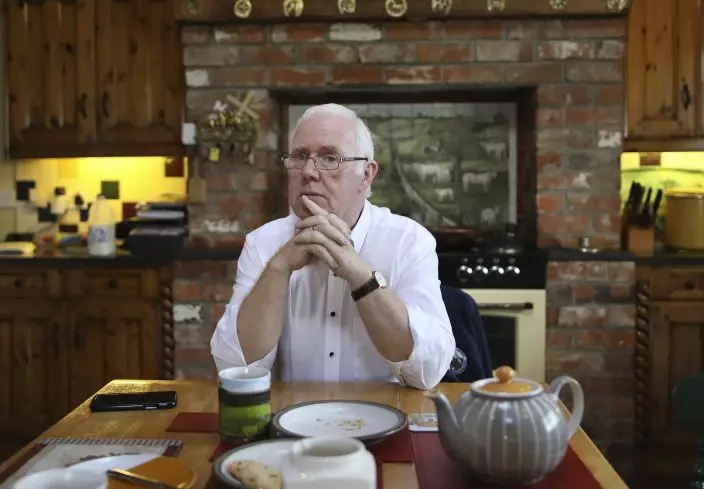
In this photo taken Wednesday Oct. 16, 2019 Eugene Reavey talks to the Associated Press at his home in Whitecross in South Armagh,Northern Ireland. Peace is personal for Reavey. He lost three brothers to the conflict in Northern Ireland, which claimed more than 3,500 lives over three decades.(PhotoPeter Morrison)
People gathered at crossing points along the frontier Wednesday, demanding that politicians protect a peace that suddenly seems in jeopardy.
At a crossing near the Irish town of Dundalk, adults and children wearing headlamps warmed themselves around a flaming trashcan. Local activists carried signs like "No Border Here Ever," insisting that negotiators remember the people of Northern Ireland as they thrash out a deal on Britain's departure from the European Union, which many fear could reignite tensions along the border.
The 1998 Good Friday Agreement ushered in two decades of relative peace and prosperity on both sides of the border between the U.K.'s Northern Ireland and the Republic of Ireland. That stability was possible, in part, because both countries were members of the European Union. Once the hated military checkpoints were removed, no barriers at all were needed on the border between two EU nations.
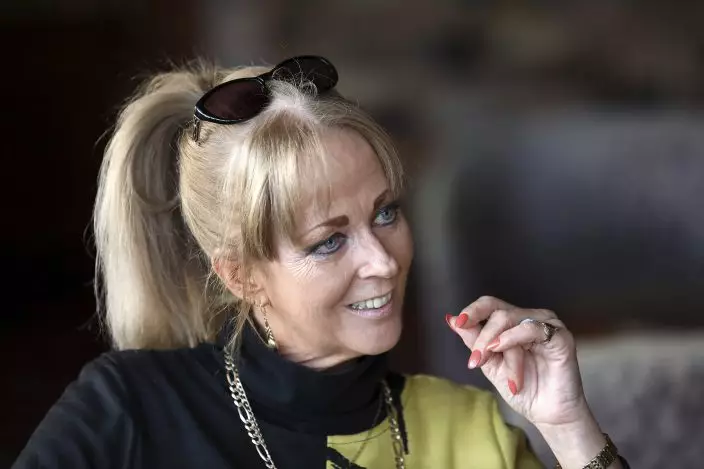
In this photo taken on Wednesday Oct. 16, 2019, Toni Carragher former Secretary of the South Armagh farmers and residents committee speaks to the Associated Press in the border town of Newry, Northern Ireland. Carragher, who campaigned to de-militarize Northern Ireland after the Good Friday accord, well remembers when the South Armagh area was one of the most militarized areas in Western Europe, with mass military and police stations everywhere. (PhotoPeter Morrison)
But with Britain's departure from the European Union, identity and customs checks could return — and with it, people fear, the enmities that caused the decades of violence.
Britain and the EU have pledged to keep the border open after Brexit, but they have struggled to find a solution that is acceptable to both sides.
While an agreement announced Thursday pledges to keep the border open, it marks only the first step to a deal. After all, Parliament rejected former Prime Minister Theresa May's deal three times. If the U.K. Parliament fails to agree, people here would potentially face a chaotic no-deal exit, with no guarantees about the border.
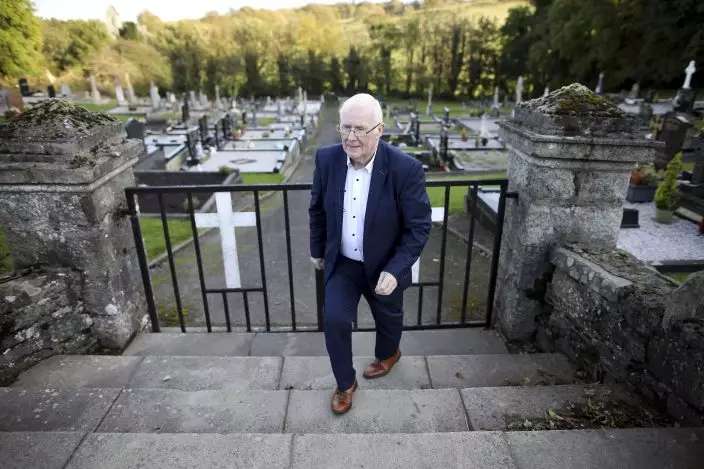
In this photo taken on Wednesday Oct. 16, 2019, Eugene Reavey leaves after visiting the graves of his three brothers in Whitecross in South Armagh, Northern Ireland. Peace is personal for Reavey. He lost three brothers to the conflict in Northern Ireland, which claimed more than 3,500 lives over three decades. (PhotoPeter Morrison)
"This community made huge compromises in the peace agreement that we have, which is the Good Friday agreement," said Declan Fearon of Border Communities Against Brexit. "We never expected that a vote taken in London would not address that Good Friday agreement in any way."
People here simply don't want to go back to "The Troubles." Toni Carragher, who campaigned to de-militarize Northern Ireland after the Good Friday accord, well remembers when the South Armagh area was one of the most militarized in Western Europe, with army and police stations everywhere. The rolling green hills felt more like a prison.
"The intrusion on one's lives in terms of the foot patrols, the stopping and searching of people's cars, when you are leaving your children to and from school, going from church, chapels, socially, whatever," she said. "You were continuously stopped and searched."
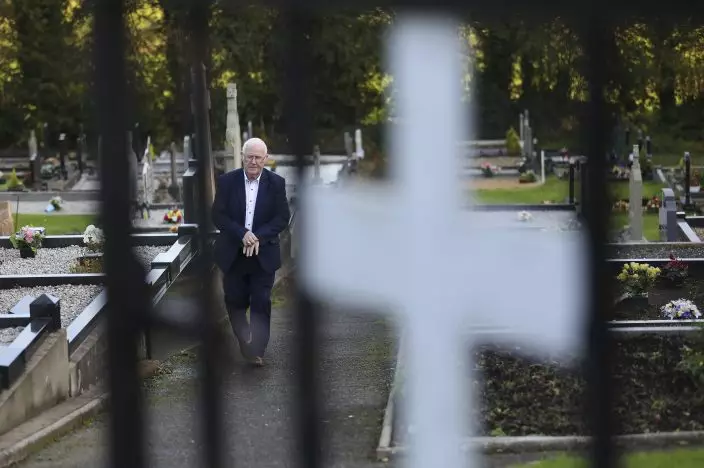
In this photo taken on Wednesday Oct. 16, 2019, Eugene Reavey leaves after visiting the graves of his three brothers in Whitecross in South Armagh, Northern Ireland. Peace is personal for Reavey. He lost three brothers to the conflict in Northern Ireland, which claimed more than 3,500 lives over three decades. (PhotoPeter Morrison)
The sectarian violence claimed both Protestant and Roman Catholic lives. Retaliatory attacks were common.
Reavey remembers the tension well. Before the protest at the border, he took reporters down a country road to the Catholic family's burial plot among green hills speckled with grazing cows. When one of the visitors remarked that the scene looked like a photo in a tourism brochure, he seemed startled and pointed out that 30 people had died on the road.
Three of his brothers — John Martin, 24, Brian, 22, and Anthony, 17 — were attacked on Jan. 4, 1976, while watching television in their home in Whitecross, County Armagh. Two died immediately, while Anthony survived the initial shooting but died weeks later. No one was ever charged.

Protesters from the Border Communities Against Brexit group hold a demonstration on the Irish border on the Republic of Ireland side, close to the town of Jonesborough, Ireland, Wednesday, Oct. 16 , 2019. The Border Communities Against Brexit group organised various protests at many points across the border region Wednesday. (AP PhotoPeter Morrison)
Reavey has been campaigning for justice for his brothers ever since.
"All those guys had their whole lives in front of them," he said. "Today I'm wondering if John Martin had gotten married, what would his kids have been doing. ... We would have more young fellas on the football team. Since the 1960s we've never had a football team without a Reavey in it."
Reavey wants his brothers' killers to be named and shamed, together with an apology from the British prime minister. He can point to the house where he believes the killers live.
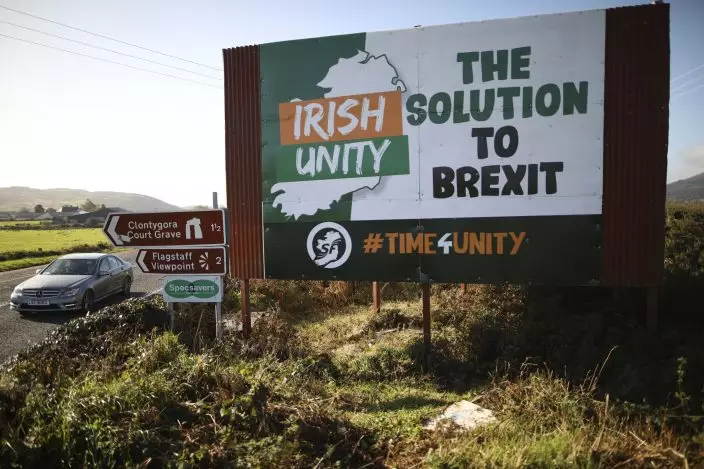
In this photo taken on Wednesday Oct. 16, 2019, motorists pass along the old Belfast to Dublin road close to the Irish border in Newry, Northern Ireland. Britain and the EU have pledged to keep the border open after Brexit, but they have struggled to find a solution that is acceptable to both sides. (PhotoPeter Morrison)
"If my brothers had been in the IRA, and there were many young fellas that was in the IRA, well, I would have put my head down and walked away," he said, his voice shaking. "My brothers were in nothing. They were completely innocent victims."
He often comes to the little graveyard to remember them. The grave is immaculate, its huge stone polished to gleaming.
The plot makes no mention of The Troubles. It simply says young men were "tragically killed in their home." That was the wish of Reavey's mother, who loathed violence.
"Our father made us all promise that we would not seek revenge, that we would not join any republican parties," he said. "And my mother, for 30 years, she prayed that the men who shot her sons would come and see a bit of sense."
Follow AP's full coverage of Brexit and British politics at https://www.apnews.com/Brexit
BEIRUT (AP) — The European Union announced Thursday an aid package for Lebanon of 1 billion euros — about $1.06 billion — much of which will go to boost border control to halt the flow of asylum seekers and migrants from the small, crisis-wracked country across the Mediterranean Sea to Cyprus and Italy.
The deal follows other EU aid packages for countries such as Egypt, Tunisia and Mauritania to fortify their borders. It comes against a backdrop of increasing hostility toward Syrian refugees in Lebanon and a major surge in irregular migration of Syrian refugees from Lebanon to Cyprus.
European Union Commission President Ursula von der Leyen said during a Beirut visit with Cypriot President Nikos Christodoulides that the aid distribution will start this year and last till 2027.
The bulk of the aid — 736 million euros — would go to support Syrian refugees “and other vulnerable groups” in Lebanon, while 200 million euros are meant to bolster Lebanese security services in enforcing border and migration control, according to figures provided by the Cypriot government.
An unspecified amount would go to Lebanese fishermen, to discourage them from selling their boats to smugglers.
Von der Leyen said the EU will also work on a “more structured approach to voluntary return" of Syrian refugees "in close cooperation with” the U.N. refugee agency. The bloc will continue to maintain “legal pathways” for resettlement of refugees in Europe, she said.
Lebanon's caretaker Prime Minister Najib Mikati praised the package, saying that “Lebanon’s security is security for European countries and vice versa,” and that an escalation of the crisis ”will not be limited to Lebanon but will extend to Europe."
Lebanon, which has been in the throes of a severe financial crisis since 2019, hosts nearly 780,000 registered Syrian refugees and hundreds of thousands more who are unregistered, the world's highest refugee population per capita.
Lebanese political officials have for years urged the international community to resettle the refugees in other countries or assist their return to Syria — voluntarily or not. Lebanese security forces have stepped up deportations of Syrians over the past year.
Tensions further flared after an official with the Christian nationalist Lebanese Forces party, Pascal Suleiman, was killed last month in what military officials said was a botched carjacking by a Syrian gang. The incident prompted outbreaks of anti-Syrian violence by vigilante groups.
Meanwhile, Cypriot authorities complain the island nation has been overwhelmed by irregular migration of Syrian asylum seekers, many of them coming on boats from Lebanon.
The UNHCR in Lebanon said it had verified 59 “actual or attempted” departures by boats carrying a total of 3,191 passengers from Lebanon between January and mid-April, compared to three documented boat movements carrying 54 passengers in the same period last year. Usually, few boats attempt the much more dangerous crossing in the winter. In all of 2023, UNHCR recorded 65 boat departures carrying 3,927 passengers.
Cyprus has taken a new approach to halting the flow of migrants. Last month, it suspended processing of Syrian asylum applications, and human rights groups accused the Cypriot coast guard of forcibly turning back five boats carrying about 500 asylum seekers coming from Lebanon. Cypriot officials have denied this.
Bassel al-Shayoukh, a Syrian refugee from Idlib living in Lebanon since 2014, said his brother and several cousins and nephews were on one of the boats turned back. Now he wants to make the journey himself.
“In the beginning I thought that in a year or two the war would be over in Syria,” he said, but it dragged on, while in Lebanon “every year ... the situation began to get worse.”
Shayoukh said he fears being beaten by vigilantes or deported to Syria after Lebanese authorities declined to renew his residency permit.
His 17-year-old nephew, who declined to give his name fearing for his safety, said the Cypriot coast guard started making waves to push the boat he was on away. “I was terrified... I don’t know how to swim,” he said. “I thought we were going to die.”
The people on the boats “stayed three days without food or water” before turning back to Lebanon, the teen added.
Back in Lebanon, they were detained by the army; those registered with UNHCR were released and the others deported.
Mohammed Sablouh, a Lebanese human rights lawyer who works on refugee and migrant cases, says Lebanese authorities are deliberately “turning a blind eye" to the surge in migration to "pressure the international community.”
The Lebanese army did not respond to a request for comment on their measures to combat smuggling.
Thursday's aid announcement comes ahead of the annual fundraising conference for the Syrian crisis in Brussels later this month. After 13 years of civil war, donor fatigue has set in while the world’s attention is occupied by the humanitarian fallout of more recent conflicts in Ukraine and Gaza.
The Cypriot president said Thursday was a “historic day” and called for European officials to go farther and declare some areas of Syria safe for return.
“The current situation is not sustainable for Lebanon. It is not sustainable for Cyprus, it is not sustainable for the European Union,” Christodoulides said.
But not all Lebanese officials are convinced the European aid would solve the problem.
Lebanese Forces party head Samir Geagea told The Associated Press earlier this week that European authorities are mainly concerned “that the refugees don’t go to Europe."
"For us the problem is that we cannot have our country drowning in illegal Syrian refugees,” Geagea said, urging for Syrians to be sent back to either government or opposition-held areas of the neighboring country.
But Shayoukh says he has nowhere to go.
The Damascus government wants him for opposing Syrian President Bashar Assad, he said, while the Islamist group that now controls his hometown behaves "the same way as the regime’s intelligence services” in crushing dissidents.
Associated Press writer Menelaos Hadjicostis in Nicosia, Cyprus, contributed to this report.
Follow AP’s global migration coverage at: https://apnews.com/hub/migration

Lebanese caretaker Prime Minister Najib Mikati, center, speaks during his meeting with Cyprus' President Nikos Christodoulides, left, and President of the European Commission Ursula von der Leyen at the government palace in Beirut, Lebanon, Thursday, May 2, 2024. (AP Photo/Hassan Ammar)
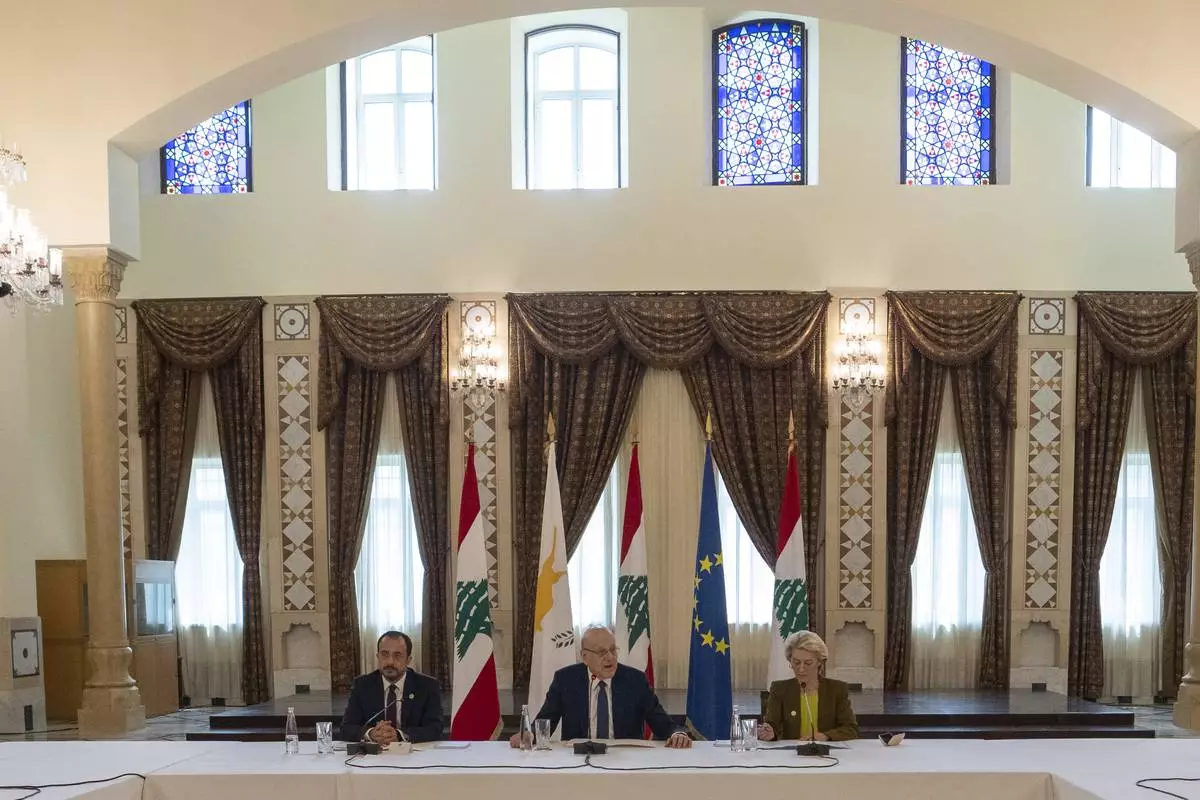
Lebanese caretaker Prime Minister Najib Mikati, center, speaks during his meeting with Cyprus' President Nikos Christodoulides, left, and President of the European Commission Ursula von der Leyen at the government palace in Beirut, Lebanon, Thursday, May 2, 2024. (AP Photo/Hassan Ammar)
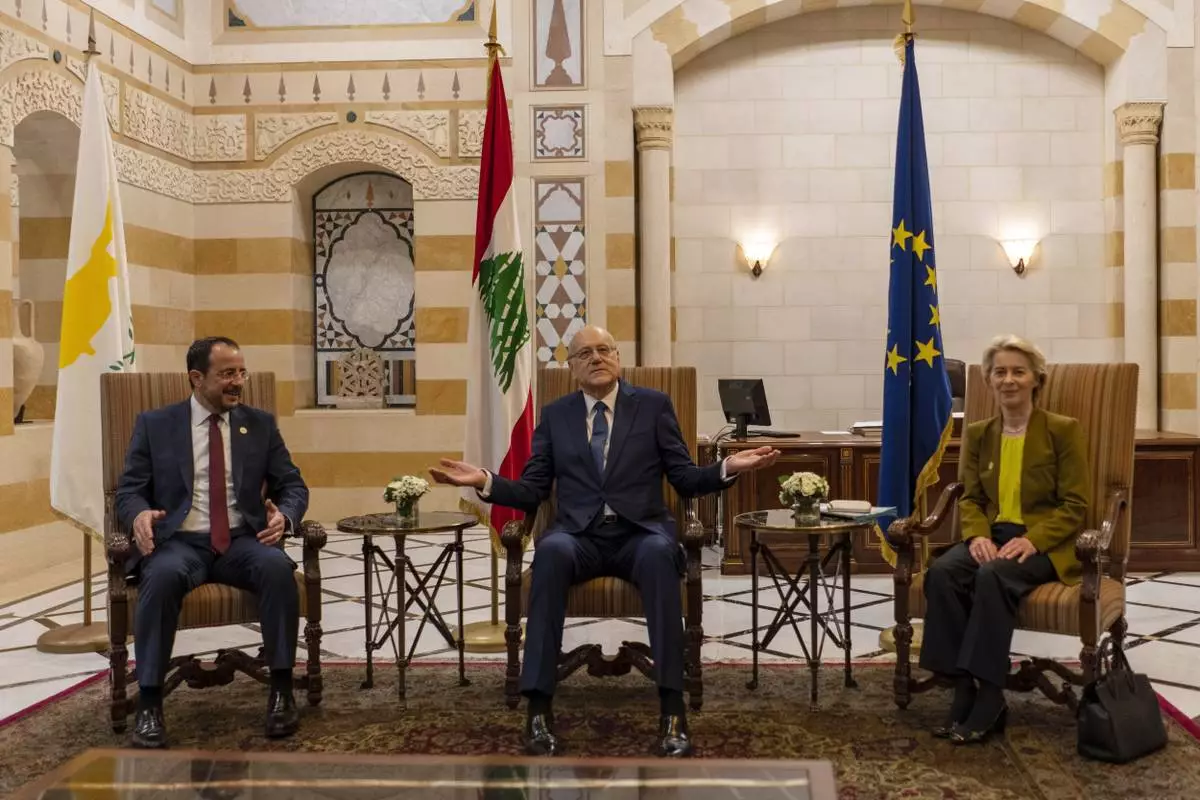
Lebanese caretaker Prime Minister Najib Mikati, center, welcomes Cyprus' president Nikos Christodoulides, left, and President of the European Commission Ursula von der Leyen before their meeting at the government palace in Beirut, Lebanon, Thursday, May 2, 2024. (AP Photo/Hassan Ammar)
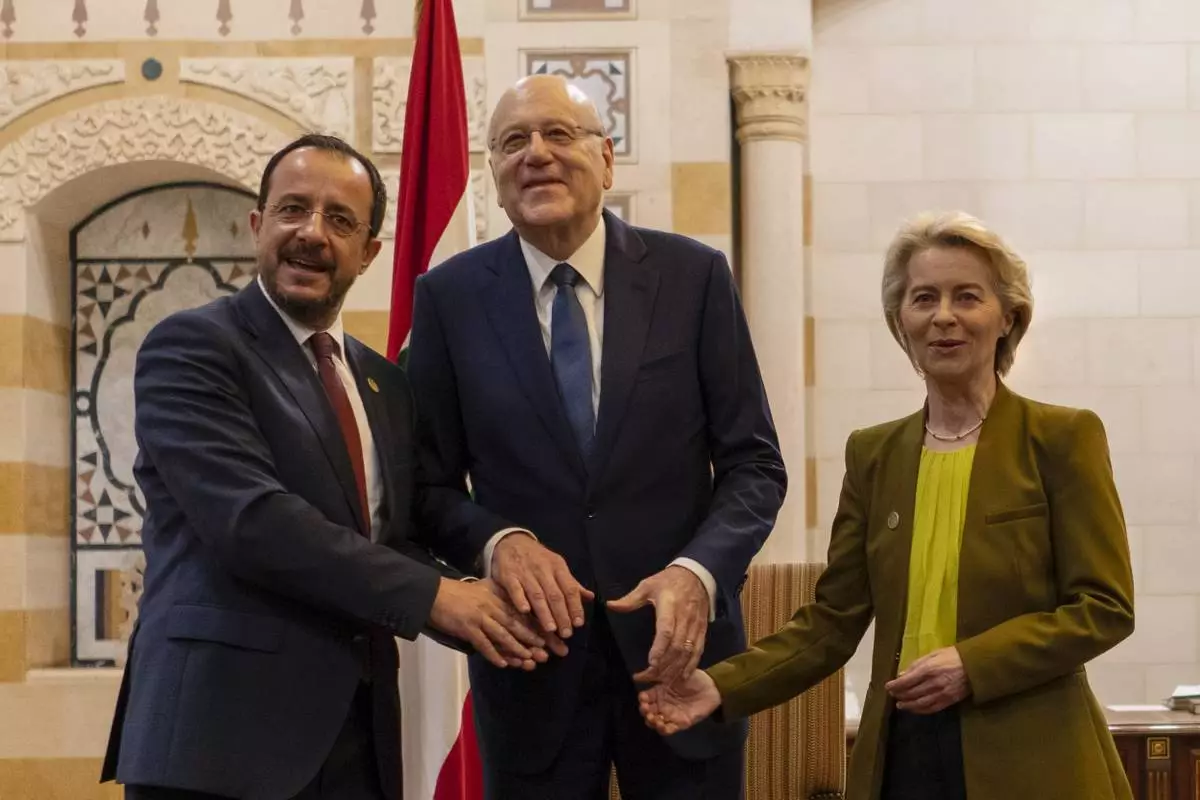
Lebanese caretaker Prime Minister Najib Mikati, center, Cyprus' President Nikos Christodoulides, left, and President of the European Commission Ursula von der Leyen pose for photograph at the government palace in Beirut, Lebanon, Thursday, May 2, 2024. (AP Photo/Hassan Ammar)
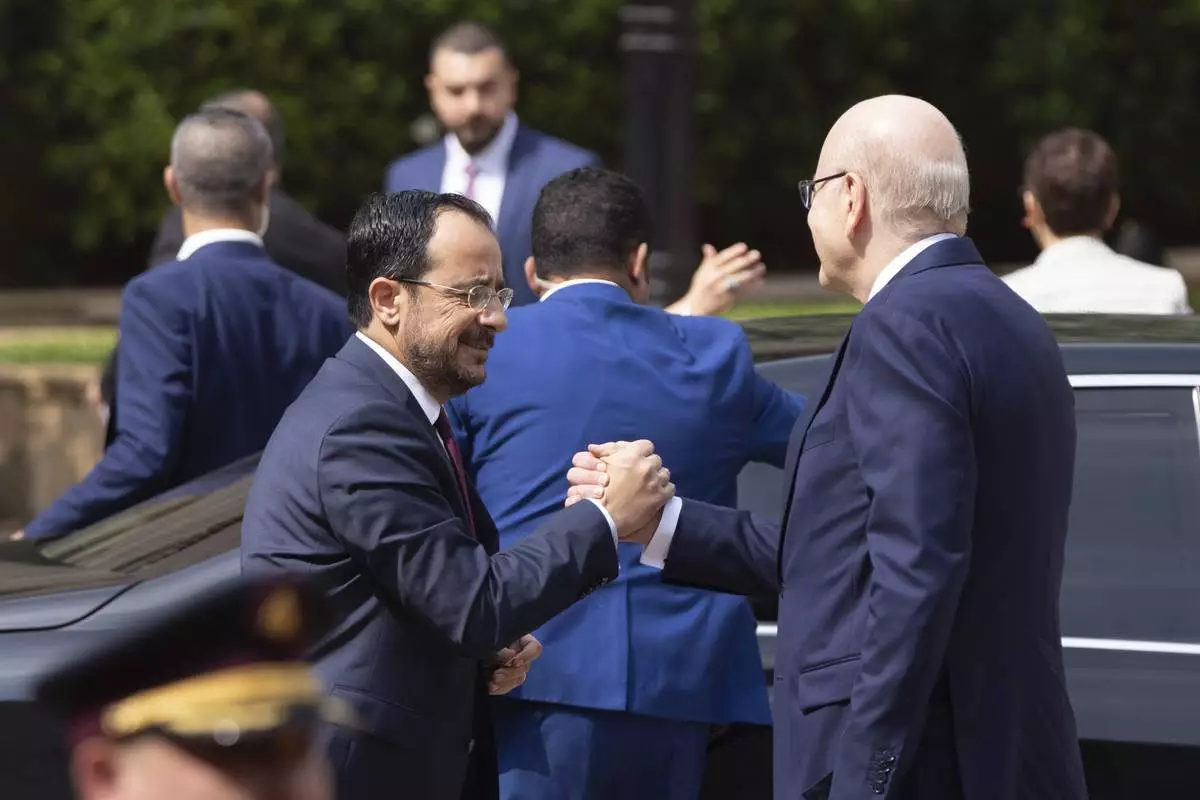
Lebanese caretaker Prime Minister Najib Mikati, right, welcomes Cyprus' president Nikos Christodoulides before their meeting at the government palace in Beirut, Lebanon, Thursday, May 2, 2024. (AP Photo/Hassan Ammar)

Cyprus' President Nikos Christodoulides, left, and President of the European Commission Ursula von der Leyen, center, review an honor guard upon their arrival to meet with the Lebanese Speaker Nabih Berri, in Beirut, Thursday, May 2, 2024. (AP Photo/Hussein Malla)

Lebanese caretaker Prime Minister Najib Mikati, center, speaks during his meeting with Cyprus' President Nikos Christodoulides, left, and President of the European Commission Ursula von der Leyen at the government palace in Beirut, Lebanon, Thursday, May 2, 2024. (AP Photo/Hassan Ammar)
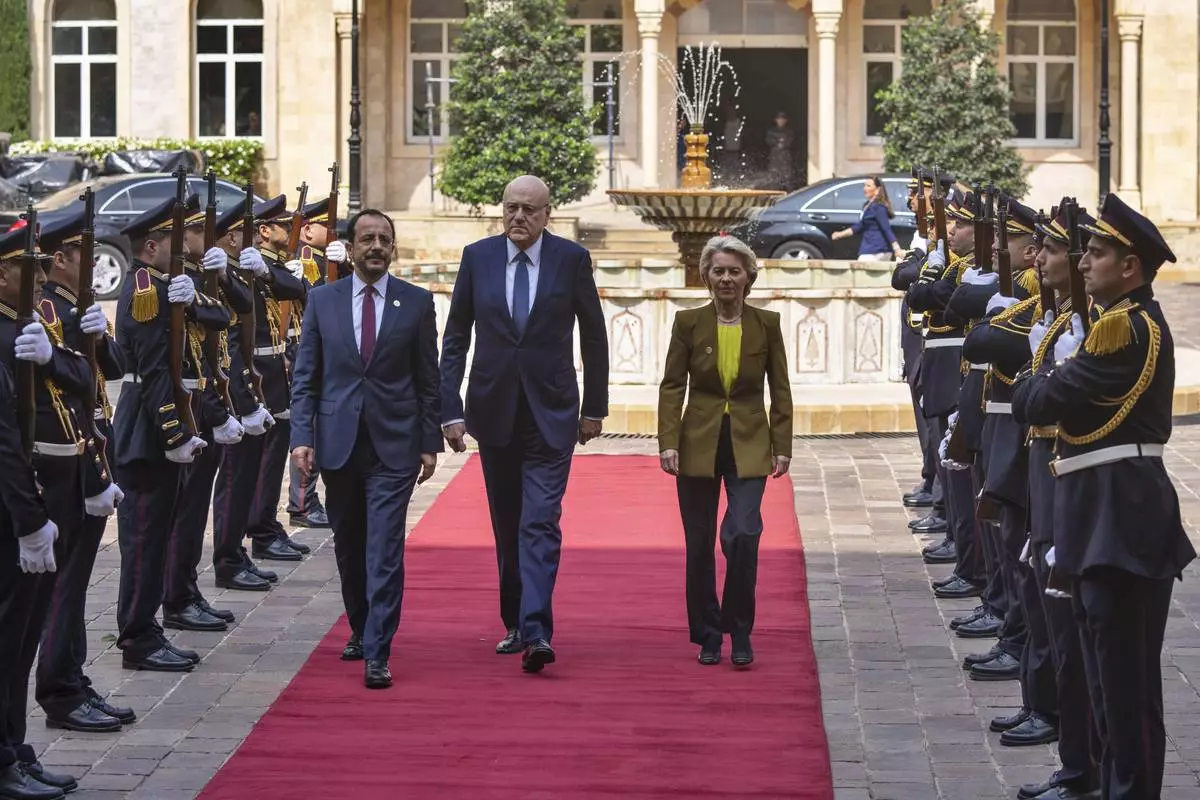
Lebanese caretaker Prime Minister Najib Mikati, center, welcomes Cyprus' President Nikos Christodoulides, left, and President of the European Commission Ursula von der Leyen at the government palace in Beirut, Lebanon, Thursday, May 2, 2024. (AP Photo/Hassan Ammar)

















